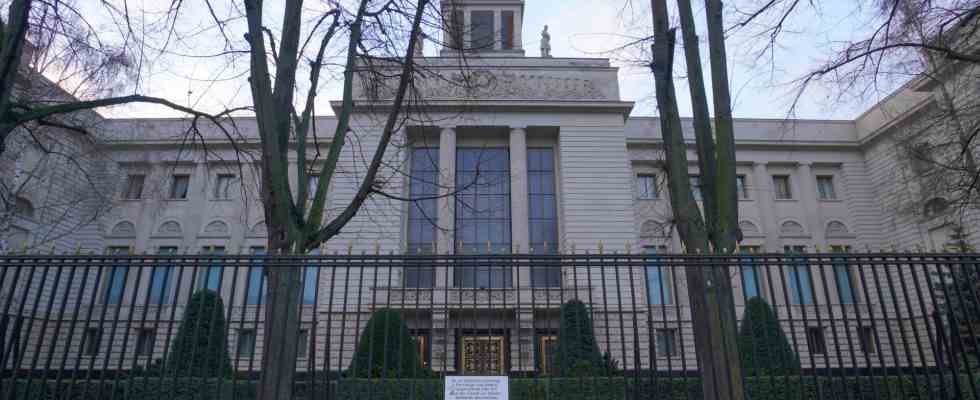Status: 03/30/2023 08:20 a.m
President of the Office for the Protection of the Constitution Haldenwang warns in conversation with contrasts against an increase in Russian espionage activities in Germany. According to his authority, Russia will also increasingly rely on cyber attacks – for espionage and sabotage.
By David Hoffmann, Daniel Laufer and Markus Pohl, RBB
The Federal Office for the Protection of the Constitution fears that Russian secret services could become more active in Germany in the future. That’s what President Thomas Haldenwang said ARD-political magazine contrasts. “Russia will use all methods to increase its influence, to gain knowledge and to procure the products it needs for its armaments.” It is therefore to be expected that it will expand its espionage activities. “We have to be prepared for that,” says Haldenwang. “We are at the same level as we were in the Cold War.”
Russian secret services are focusing on political Berlin. At the Russian embassy in the heart of the government district and at its consulates earlier this year contrasts-Information 544 diplomats accredited. Experts assume that a third of them work for Putin’s secret services. According to its own information, the Office for the Protection of the Constitution knows of a number of agents disguised as diplomats.
disguised as diplomats
“The decisive advantage of this camouflage is that these people enjoy criminal immunity,” says Maik Pawlowsky, who heads counterintelligence at the Office for the Protection of the Constitution. “You can spy in Germany, but the state cannot prosecute these people. If you catch them in the act, the only option is to expel them from the country.”
The German security authorities noticed Andrei Siwow, who was temporarily accredited as a military attaché in Germany. Unofficially Siwow is said to have worked for the GRU military intelligence service. In November 2022, the Düsseldorf Higher Regional Court convicted one of Siwow’s German contacts of intelligence activities for Russia. Reserve officer Ralph G. had provided the GRU with information about the Bundeswehr. Some of the handovers took place directly in the Russian embassy.
A few years ago, Siwow is said to have tried to establish contact with the CDU member of the Bundestag, Roderich Kiesewetter. As the foreign and security politician reports, Siwow approached him one evening in front of the building where he has his MP’s office. The suspected GRU agent was extremely friendly and apparently happened to be walking by with his wife and dog. “After two or three questions, he then admitted that he was the Russian military attaché,” says Kiesewetter. “I found that amazing.”
Kiesewetter calls for a general sensitization to the threat emanating from Russia. Espionage was apparently tolerated by German politicians for a long time. With the attack on Ukraine, something fundamentally changed. In April 2022, the federal government declared 40 Russian diplomats undesirable and asked them to leave Germany – including suspected spies. More than 400 diplomats were expelled across Europe.
“It was a hard blow for the Russian intelligence services,” according to the intelligence officer Pavlovsky contrasts. The information obtained through human sources is of particular importance to them. “They will try to compensate for this information gap – how exactly cannot be predicted at the moment.”
Remote cyber attacks
Russia could attack more often from afar in the future. The Office for the Protection of the Constitution assumes that the Russian services could increase their cyber activities. Germany has been a target of such attacks for years. One group of concern for security agencies is known as “ghostwriters.” “We assume that the GRU is behind ‘Ghostwriter’,” says Jadran Mesic, group leader of the “cyber defense” department of the Federal Office for the Protection of the Constitution.
Since spring 2021, “Ghostwriter” has attacked dozens of parliamentarians in Germany and people who are otherwise active in the political sphere. The exact number is unknown. Among other things, the attackers practice what is known as phishing: they sent fake e-mails and tried to get their target persons to reveal their passwords. According to the Office for the Protection of the Constitution, “Ghostwriter” used a technically less demanding program called “Gophish”.
In Germany, the Brandenburg member of parliament Danny Eichelbaum from the CDU has become the target of a cyber attack by “ghostwriter”. In the spring of 2021, the Office for the Protection of the Constitution warned him. “You ask yourself: Why was I chosen?” says Eichelbaum. “Has data already been used? What happened to the data?” Eichelbaum doubts that he actually entered his password in the “Ghostwriter” fake at the time – but is not sure. There was apparently no public reaction from the attackers in his case.
Access to Social Media Accounts
Once the attackers have access to their victims’ email accounts, they could copy their address books, says Mesic. They could also “use access to the email account for follow-up activities, disinformation operations and gain access to the social media accounts.” Something like that could have serious consequences – for example during an election campaign. The attackers want to ruin their victims’ reputations. In Poland, “Ghostwriter” hijacked the Twitter account of a high-ranking politician from the ruling PiS party and published photos on it that were supposed to show a politician in intimate poses.
The President of the Office for the Protection of the Constitution, Thomas Haldenwang, warns that Russian cyber attacks could also be used for sabotage in the future. There have been serious cases in other countries – for example in Ukraine, where Russian services had attacked the power supply. “These are skills that are available and one can assume that they would also be used against Germany if necessary.”
The film “In the sights of the Kremlin – Russian espionage against Germany” – already in the ARD media library and at 9.45 p.m. at Kontraste in the first

